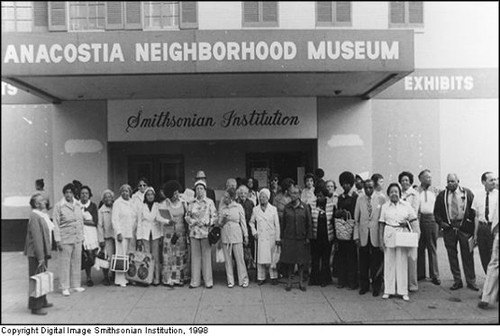 Symposium: Museums and Communities. The Heritage of Belonging. Foto van Anacostia Community Museum
Symposium: Museums and Communities. The Heritage of Belonging. Foto van Anacostia Community Museum
Symposium: Museums and Communities. The Heritage of Belonging
This conference focuses on the interaction between museums and communities. In times of mobility and change, history museums play an important role in societal questions of social cohesion, identity and belonging. In search of their roots, people turn to heritage. History is popular as never before and it surfaces in all contemporary media. At the same time, the communication era offers new possibilities to form communities, based on common interests and preferences or popular and corporate culture. Museums in general, as part of the public sphere, are an important tool in this dynamic process of heritage formation and the performance of community.
To address these questions related to museums and communities, the Erasmus University Rotterdam organises an international conference in Rotterdam in November 2012. The conference features two keynote speakers. Richard Sandell will explore what happens when museums move away from the impartial narrative and adopt a more activist approach. Kevin Moore will present a paper on the complex relationship between museums and sports and its potential role in community building. In addition, several international experts from the field of museum studies will present fresh insights and
Register
Send a mail with your name and affiliation to Hélène Verreyke at verreyke@eshcc.eur.nl.
Location
NAi Netherlands Architecture Institute
Rotterdam, The Netherlands
Organised by
Erasmus University Rotterdam
Erasmus School of History, Culture and Communication
Conference Program
9th of November
Chair Prof. dr. Paul van de Laar
9:00 – 9:30 Registration & Coffee
9:30 – 09:45 Welcome by Prof. Dr. Dick Douwes, Dean of ESHCC and Prof. dr. Marlite Halbertsma
Session 1: The heritage of belonging
09:45 – 10:45 Hélène Verreyke – Public participation in the museum. When practice creates meaning
10:45 – 11:15 Luciana Aenasoaie – Let the Walls of History Speak: Constructing European Heritage through the Restoration of Neamt Fortress, Romania
11:15 – 11:30 Coffee
11:30 – 12:00 Louise Anne D. Marcelino – Making a Shoe Last: Reprogramming the Marikina Shoe Museum and the Historic House of Don Laureano Guevara
12:00 – 12:30 An Lombaerts & Nadia Babazia – The Red Star Line connecting past and present
12:30 – 13:30 Lunch
Session 2: Questioning belonging
13:30 – 14:00 Susan Hogervorst – Musealization of memory. Survivor communities, camp sites and the re- negotiation of the past
14:00 – 14:30 Robin Ostow – Museums as entrepreneurs in community building. Warsaw’s New Jewish Museum: Building a new history and a twenty-first century democracy
14:30 – 15:00 Maloe Sniekers and Stijn Reijnders – In the Grip of Dutroux. Heritage that Doesn’t Want to Belong
15:00 – 15:15 Coffee
15:15 – 16:15 Keynote lecture:
Richard Sandell – Activism and the museum
16:15 – 16:45 General discussion
10th of November
Chair dr. Stijn Reijnders
9:00 – 9:30 Registration & Coffee
Session 3: New heritage communities & New media
9:30 – 10:30 Dorus Hoebink – The museum and the performance of community
10:30 – 11:00 Jennifer A. Scott & Elissa Blount Moorhead – Building a Community Museum: Using Social Media to Engage Communities at Weeksville Heritage Center in New York
11:00 – 11:15 Coffee
11:15 – 11:45 Marie Van Cranenbroeck – Social network websites, museums and audiences. From ‘passive’ visitor to ‘active’ co-creator of cultural heritage?
Session 4: How public heritage participation changes the museum
11:45 – 12:15 Jacqueline van Leeuwen & Hildegarde Van Genechten – “Tell me, what did you gain?” How to assess the creation of value in co- creative museum projects
12:15 – 13:00 Lunch
13:00 – 13:30 Susan Ashley – A Museum of our own. Immigrant museum- making in Canada
13:30 – 14:00 Ciara Canning – Out in the Open or Out of our Depth? A case study of a museum project working with homeless people
14:00 – 15:00 Keynote lecture
Kevin Moore – Museums and sport: the heritage of belonging?
15:00 – 15:30 General discussion and concluding remarks
Museology / Community & Learning / Innovative heritage /